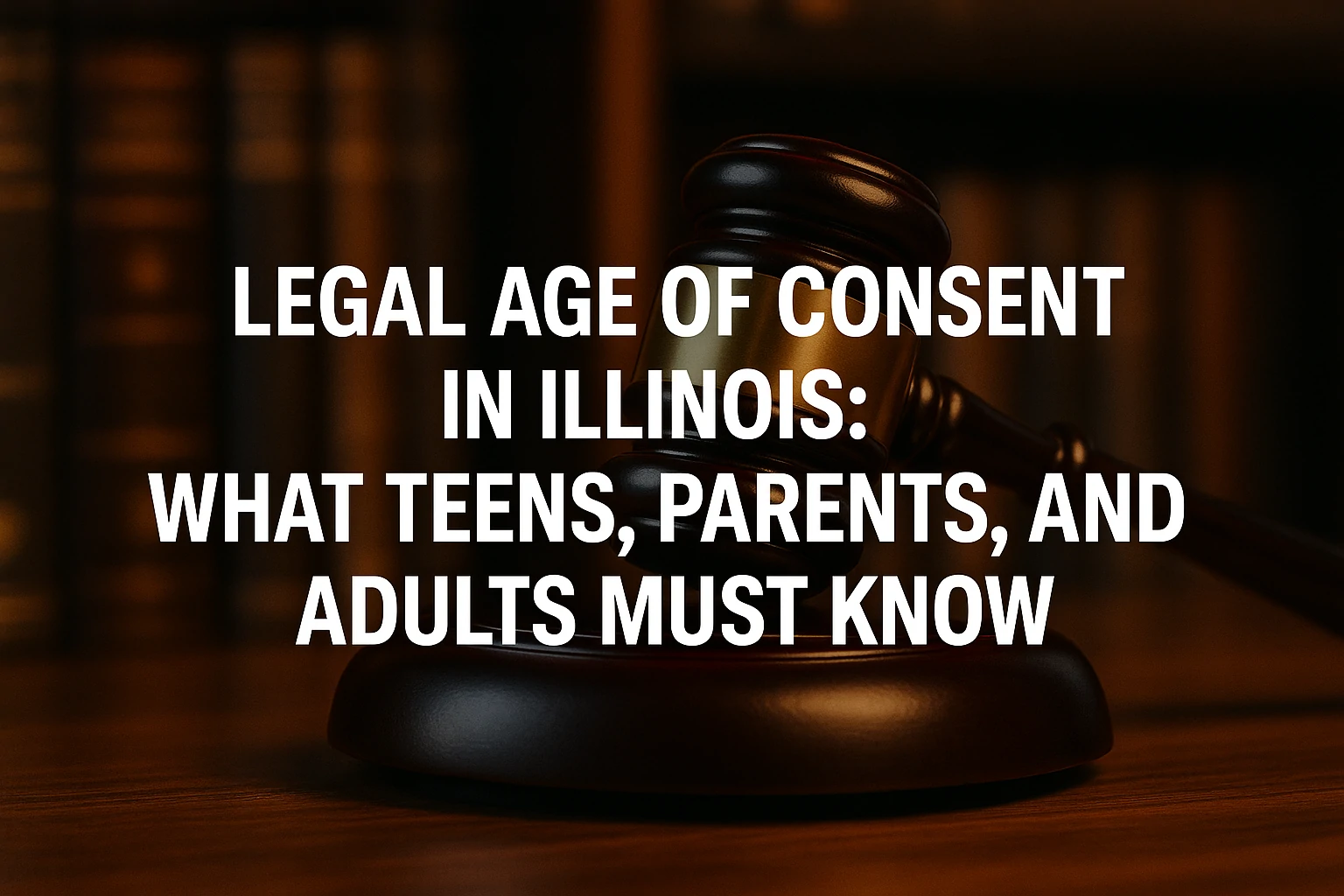Consent is a serious issue. In Illinois, the law gives a clear answer about when a person can legally agree to sex. This answer matters to teens, parents, teachers, and adults. It can protect people from harm. It can also prevent legal mistakes that ruin lives.
Many people believe false ideas about age and consent. Some think turning 16 makes sex legal everywhere. Others assume both people must be the same age. These beliefs do not match the law in Illinois. One wrong move, one bad choice, and someone may end up in court.
Young people need facts, not myths. Parents must know how to talk to their kids about sex and law. Adults must take steps to protect their future. This guide gives clear answers in plain words. It explains the law in full detail so that every reader can understand the truth.
Illinois does not allow guesswork. The court does not accept “I didn’t know.” This article shows how to avoid mistakes. It also shows how to stay safe, how to help others, and what happens if someone crosses the legal line.
Illinois Consent Age Law
The law in Illinois sets the age of consent at 17. That means no one under 17 can legally agree to sex. If someone older than 17 has sex with a person younger than 17, that is a crime. Even if the younger person says “yes,” the law says that yes does not count.
This rule protects teens from pressure and abuse. It also protects adults from legal risk. In many cases, both people feel the relationship is okay. But the law still says no. Feelings do not change the rule.
Once a person turns 17, they may legally agree to sexual acts in most cases. But even then, the law still checks other details. If one person has power or control over the other, the law may still step in. Age is only one part of the rule.
Is It Illegal to Date Someone Under 17 in Illinois?
Dating itself is not a crime in Illinois. You can spend time, go out, or have a relationship with someone under 17. The law only steps in when sexual contact happens. Once sex enters the picture, the rules change. The younger person’s “yes” no longer counts as legal consent.
Many teens and adults confuse dating with sexual consent. They think a relationship makes everything legal. That is wrong. A 15-year-old can date a 17-year-old, but they cannot legally have sex. If that happens, the older teen could face a charge even if both agreed.
Parents often worry when their teen dates an older person. That fear is fair. The age gap can turn into a legal risk fast. Keeping the relationship respectful and free of sexual acts is the only safe path. Once it crosses that line, the law takes control. No emotion or excuse can undo the risk once the act occurs.
Does the Law Change If Both People Are Underage?
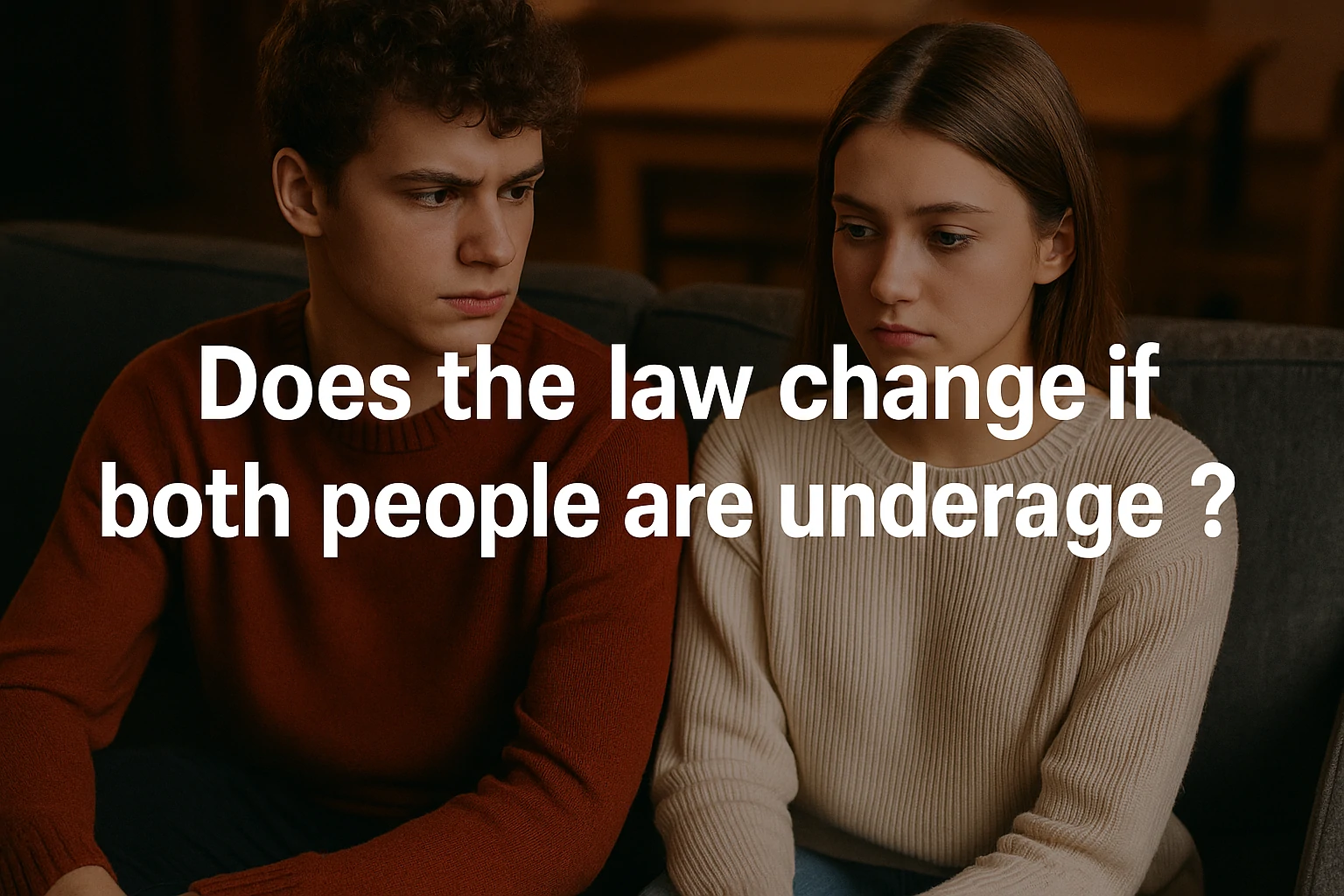
When both people are under 17, the law handles the case differently. Illinois still sets 17 as the legal age of consent. But if two teens are close in age and both are minors, the law may not treat them like adults.
If a 16-year-old has sex with another 16-year-old, the case may not lead to charges. But if one person is 16 and the other is 14, the state may act. The bigger the age gap, the more likely the court will step in. Illinois law checks age, maturity, and risk of harm.
The court may also look at past behavior, home life, and other factors. Even if both teens agree to the act, the law may still say the consent is not valid. Parents and teens should not assume that two minors are always safe from legal trouble. The line is thin, and one mistake can lead to court.
People in Power Face Stricter Rules
A person in a trusted role must follow tougher laws. That includes teachers, coaches, therapists, religious leaders, and supervisors. These people have control over minors or younger adults. The law says they cannot use that control to start sexual relationships.
Even if the student or worker is over 17, the older person may still face charges. The law does not allow people in power to cross those lines. Trust and control change how consent works. Illinois treats those cases with more care.
A coach dating a 17-year-old team member could go to jail. A teacher sleeping with a senior in high school may lose their job and face prison. Power creates risk. The law takes that risk seriously.
What Happens During a Police Investigation?
Once someone reports a possible consent law violation, police take over fast. They may visit the people involved. They will ask questions. They may also collect phones, messages, or photos. Even small details matter in these cases.
The police may talk to friends, teachers, or family members. They may check social media or school records. If they see proof of sexual contact with a minor, they can arrest the older person. That arrest may happen before any trial begins.
The accused person should not speak without a lawyer. What you say can be used in court. Even a short message or a wrong word may turn against you. Police may sound friendly, but they build a case with every answer. Staying silent and calling a lawyer is the best first move.
Can a 17-Year-Old Be Charged With a Sex Crime?
Turning 17 does not mean full legal freedom. A 17-year-old can still face charges under Illinois law. The age of consent allows a 17-year-old to agree to sex, but only with someone who is not underage. If the other person is younger than 17, it may still count as a crime.
A 17-year-old may also face charges if they use force or threats. Consent must be free, clear, and real. If someone feels fear or pressure, that is not true consent. The law does not care if both are teens. It protects the person who felt unsafe.
A 17-year-old who dates a younger teen must be careful. Even if the relationship feels right, the law may see it as abuse. Parents should explain these limits before trouble begins. Teen mistakes can follow someone into adult life. The law may forgive youth, but not all crimes go away.
What Parents Should Teach Their Kids About Consent Laws
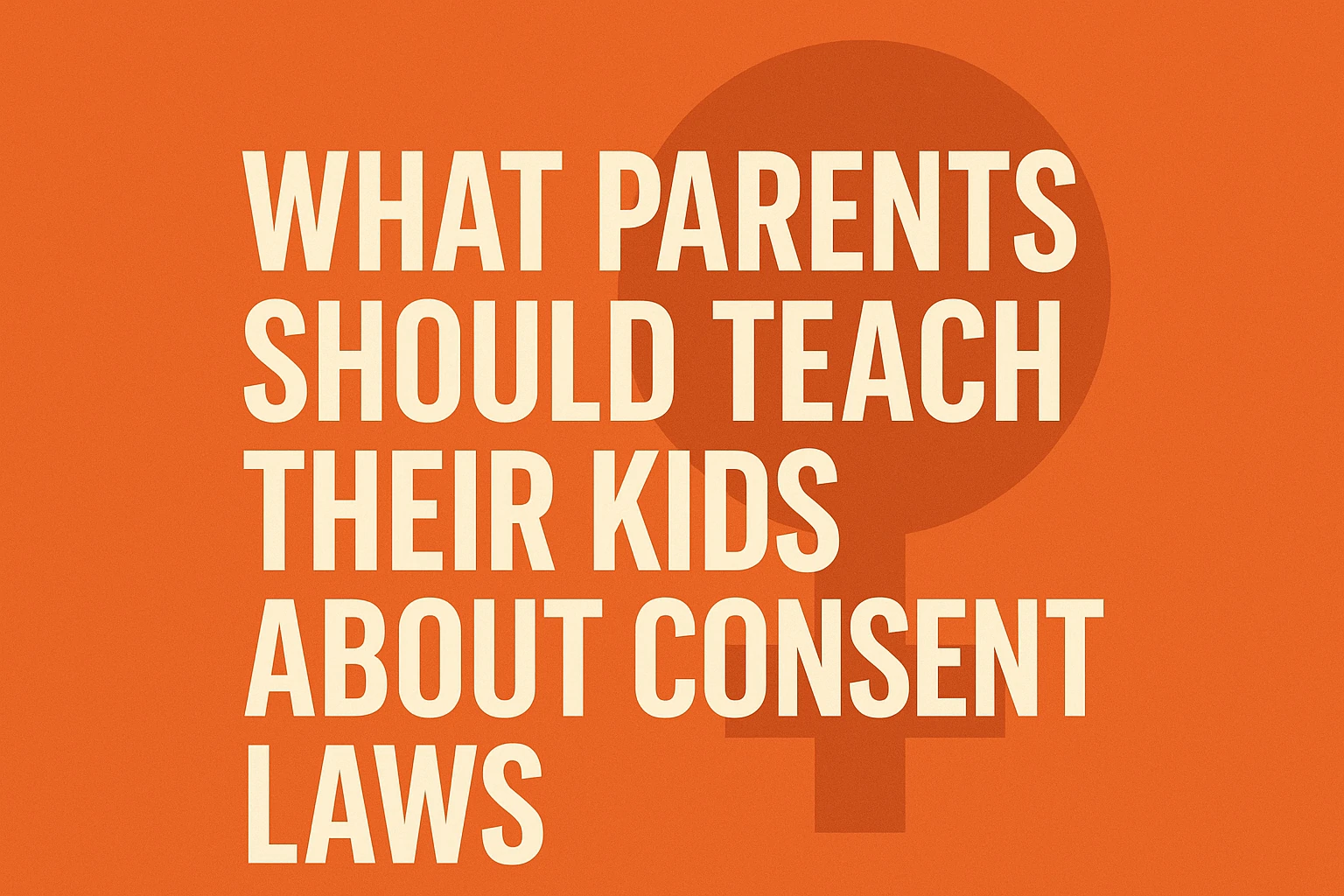
Parents play the main role in helping teens stay safe. Many young people learn about sex from friends or the internet, not from home. That leads to wrong ideas about what is legal. Parents can stop confusion with calm talks and clear facts.
They should explain that consent is not just about a word. It is about law, age, and safety. A teen may think love makes things right, but the law says otherwise. Parents should show how one small mistake can bring big problems. A good talk today can save a teen from shame or arrest tomorrow.
Parents must also teach respect. They should help their kids see that “no” always means no. They should explain that silence is not a yes. Teens who know the rules are less likely to hurt others or themselves. Honest talks build trust and protect families from fear and regret.
Do Consent Laws Apply to LGBTQ+ Relationships in Illinois?
Consent laws in Illinois apply the same way to everyone. It does not matter if the relationship is straight or LGBTQ+. The rules do not change based on gender, identity, or orientation. The age of consent stays 17 for all people.
Some teens think the law treats same-sex couples differently. That is false. A 19-year-old and a 16-year-old in a same-sex relationship face the same legal risk as a straight couple with the same ages. The court sees age, not gender, when it looks at consent.
LGBTQ+ youth also face pressure and fear about being judged. That fear does not erase the law. Safe relationships must still follow legal rules. Teens in all groups need clear talks and support to stay safe and free from legal trouble. The law protects everyone, and it also holds everyone to the same standard.
What Is Grooming and How Is It Different from Consent?
Grooming is when an older person builds trust with a minor to gain control. They may use gifts, flattery, or emotional tricks to lower a young person’s guard. Their goal is often sex. Grooming can happen over weeks, months, or even years.
A groomer may seem kind or caring. They may act like a mentor or friend. But under the surface, they aim to blur lines and cross into abuse. Grooming often ends in illegal sexual acts. It hides danger behind soft words and false love.
Consent means free and honest choice. Grooming takes that choice away. It changes how the minor thinks and feels. Illinois law does not excuse sex just because the minor agreed. If that agreement came through grooming, it does not count. The court sees it as a crime, not a real relationship.
How to Talk to Police Without Hurting Your Case
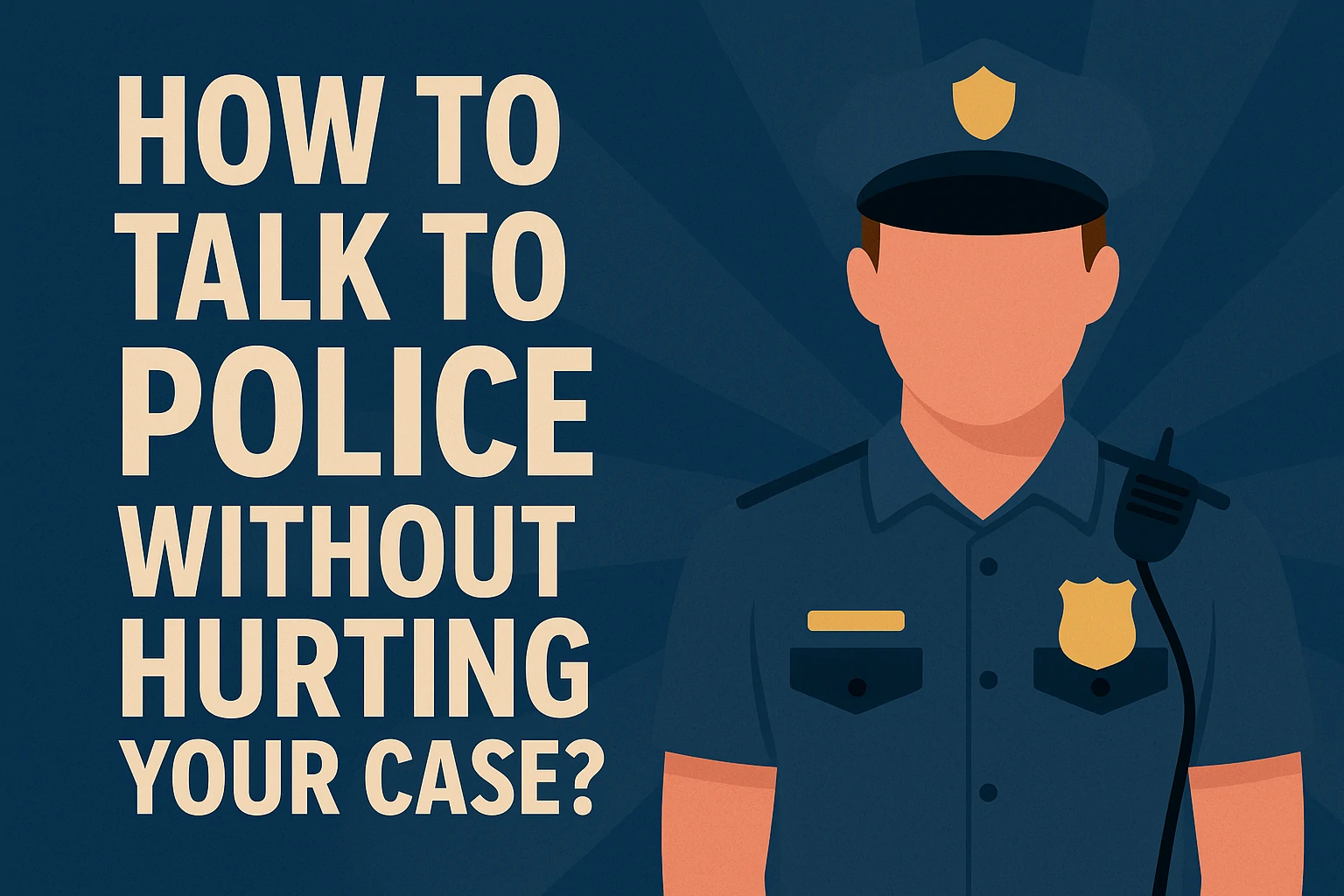
If police contact you about a consent issue, stay calm. Do not panic. Do not lie. But do not answer questions on your own. One wrong word can lead to arrest. Even innocent people make mistakes that hurt their case.
You have the right to stay silent. Use it. You also have the right to a lawyer. Ask for one before you speak. Do not try to explain your side without help. Police write down everything. A short talk can turn into evidence against you.
Never meet the other person. Do not call them. Do not text. That could break a court rule and make things worse. Let your lawyer handle all contact. The law is strict, and so is the system. Protect your future with smart moves, not fast words.
Consent and Alcohol or Drugs: What the Law Says
A person cannot give legal consent if they are drunk or high. Even if they say yes, the law may say they were not able to agree. In Illinois, sex with someone under the influence can lead to charges, even if both people are adults.
If one person drinks or uses drugs, their judgment is not clear. They may agree to something they would not allow when sober. That makes the consent weak or invalid. The law protects people in this state because their safety is at risk.
This rule matters in parties, bars, or anywhere alcohol or drugs are used. Just because someone says yes does not make it legal. You must make sure they are sober, alert, and clear in their words. If you ignore that, you risk jail, fines, or a sex crime charge.
How Schools Handle Consent Violations
Schools take consent issues very seriously. If a student reports sexual contact or abuse, the school must act. Staff members may call police. They may also speak to parents and start a full investigation. The school does not wait for proof to take action.
A student accused of breaking consent rules may face suspension or expulsion. Even before a court case starts, school leaders can remove them from class or school events. The same goes for teachers or staff members. If a trusted adult is accused, they may be placed on leave right away.
Schools often work with police, social workers, and lawyers. They also follow rules set by the state. This helps protect students and stop future harm. Teens should know that school is not a private space. Once something happens, the system responds fast and takes the side of safety.
Does Illinois Have a ‘Romeo and Juliet’ Law?
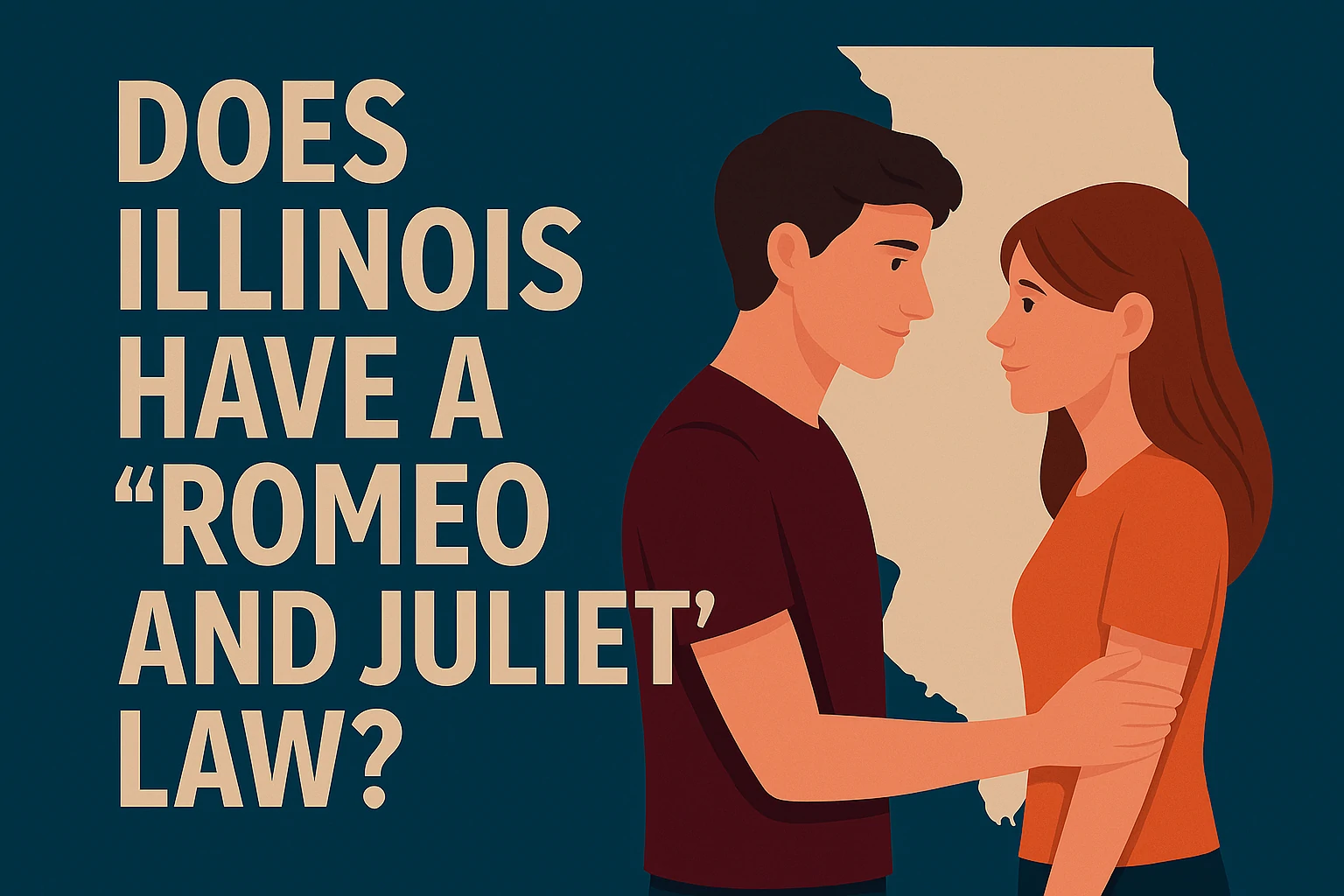
Illinois does not have a full “Romeo and Juliet” law like some other states. But the courts may treat close-in-age relationships with more care. If both people are minors and close in age, the state may lower the charges or offer a lighter sentence.
This kind of case often involves two teens who are dating. If one is 16 and the other is 17, the law may not treat it as a serious crime. But that does not mean it is legal. The older teen could still be charged. The court just has more options.
Once one person turns 18, the risk gets higher. The court expects adults to know the law and make safer choices. A two-year age gap may not sound big, but the legal outcome can be harsh. Illinois allows the court to look at the facts, but it does not promise protection.
What Judges Look For in Consent Law Cases
- Who had power or control
- Whether consent was clear and free
- If the minor was silent or pressured
- Whether the accused knew the real age
- Use of drugs, alcohol, or threats
- Any steps taken to hide the act
The court also looks at messages, photos, and past actions. If someone made plans, hid their actions, or used pressure, that adds risk. The judge may also ask if drugs or alcohol were used. These details shape the outcome.
A judge may show some care in close-age teen cases. But once an adult is involved, the court acts fast. The goal is safety. If the facts show danger or abuse, the judge may order prison, fines, or a place on the sex offender list. The law gives the judge power to protect the young.
Can You Clear a Consent-Related Record Later?
Some people want a second chance. They ask if a sex crime record can be cleared. In Illinois, that process is called expungement. It means the court removes the charge from public view. But it is not easy, and not all cases qualify.
If the charge was minor and the person stayed out of trouble, the court may agree. But if the case involved force, age gaps, or abuse, the record may stay forever. The sex offender list is even harder to leave. Most people stay on it for many years. Some stay for life.
A lawyer can help check if you qualify. You must file papers, go to court, and prove you made real changes. Even then, the court may say no. The best way to protect your record is to avoid the crime. Once you cross the line, the law follows you for years.
When Age Gaps Lead to Charges
Illinois does not allow sex with anyone under 17, even if the age gap is small. A 19-year-old and a 16-year-old could face legal trouble. Some cases allow minor exceptions. But once one person is an adult, the law expects more from them.
This is not about love. It is about law. The court does not ask how the couple feels. It only checks the age and the facts. If the numbers break the rule, the older person faces the crime.
The law in Illinois does not follow a “Romeo and Juliet” rule in the same way some other states do. There may be less punishment in cases with a small age gap. But the older person can still be charged. That can lead to arrest, trial, or even a criminal record.
If a Minor Lies About Their Age
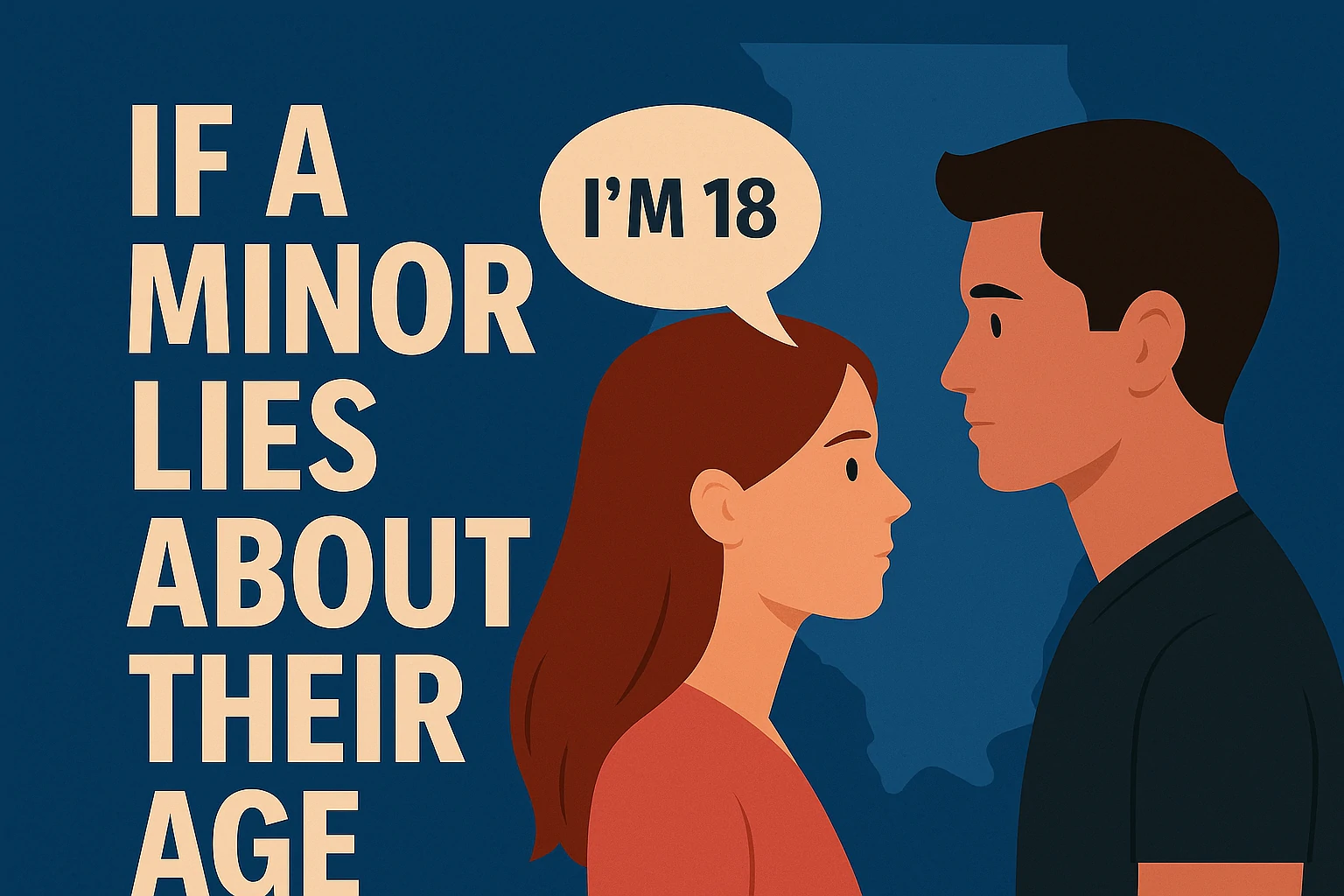
Some minors lie. They may say they are 18 when they are 15. They may show fake social media accounts or IDs. But if the older person believes that lie and has sex, they may still face charges.
Illinois law does not give a free pass. A mistake about age does not remove guilt. Courts may listen to the facts. But the law still protects the younger person, even if they started the act or gave false details.
If you are not sure about someone’s age, ask for real proof. Never take a person’s word. Never assume based on looks. The law does not care if the lie seemed true. It only cares about facts.
What the Charges May Look Like
Sex with a minor under the age of consent can lead to many charges. The most common are criminal sexual abuse or criminal sexual assault. The words may sound similar, but the punishment changes based on the case.
Some cases lead to jail. Others lead to fines, probation, or mandatory counseling. But the worst part for many people is ending up on the sex offender list. Once on that list, your name, photo, and location become public.
Being labeled a sex offender can destroy your future. You may lose jobs, homes, or the trust of your community. You may not be allowed to go near parks, schools, or certain websites. Some people stay on the list for life. Others may stay for ten years or more.
| Charge Type | Possible Outcome |
|---|---|
| Criminal sexual abuse | Jail time, fines, probation |
| Criminal sexual assault | Long-term prison, sex registry |
| Child pornography (sexting) | Prison, registry, device ban |
Sexting and Digital Dangers
Sex crimes are not just about physical acts. Digital acts matter, too. In Illinois, sending or receiving sexual photos of a minor can lead to child pornography charges. Even if both people are underage, the law still steps in.
Teens who share nude photos of themselves or others may face charges. If a minor sends a photo to an adult, that adult can still be charged for having it. Sharing the photo with anyone makes the crime worse.
The law also applies to messages, videos, and voice chats. If the content involves sex and a minor, the law may treat it as a serious crime. Even one picture can lead to years of punishment. The law does not allow room for fun or jokes in these cases.
Consent Does Not Mean Forever
Even if someone gives consent once, they can say no the next time. Consent must be clear and ongoing. A person can take it back at any time. They can stop the act and say no, even during sex.
Ignoring that change makes it a crime. The law protects the right to say no at any point. This rule applies at every age, but it matters more when one person is under 18. The younger person may feel fear or confusion. That does not mean their consent is full or real.
Adults must respect the stop sign. If a person says no, the act must end. If they freeze or say nothing, the act must stop until they speak clearly. Silence does not mean yes. The law watches this closely.
How Illinois Compares to Other States
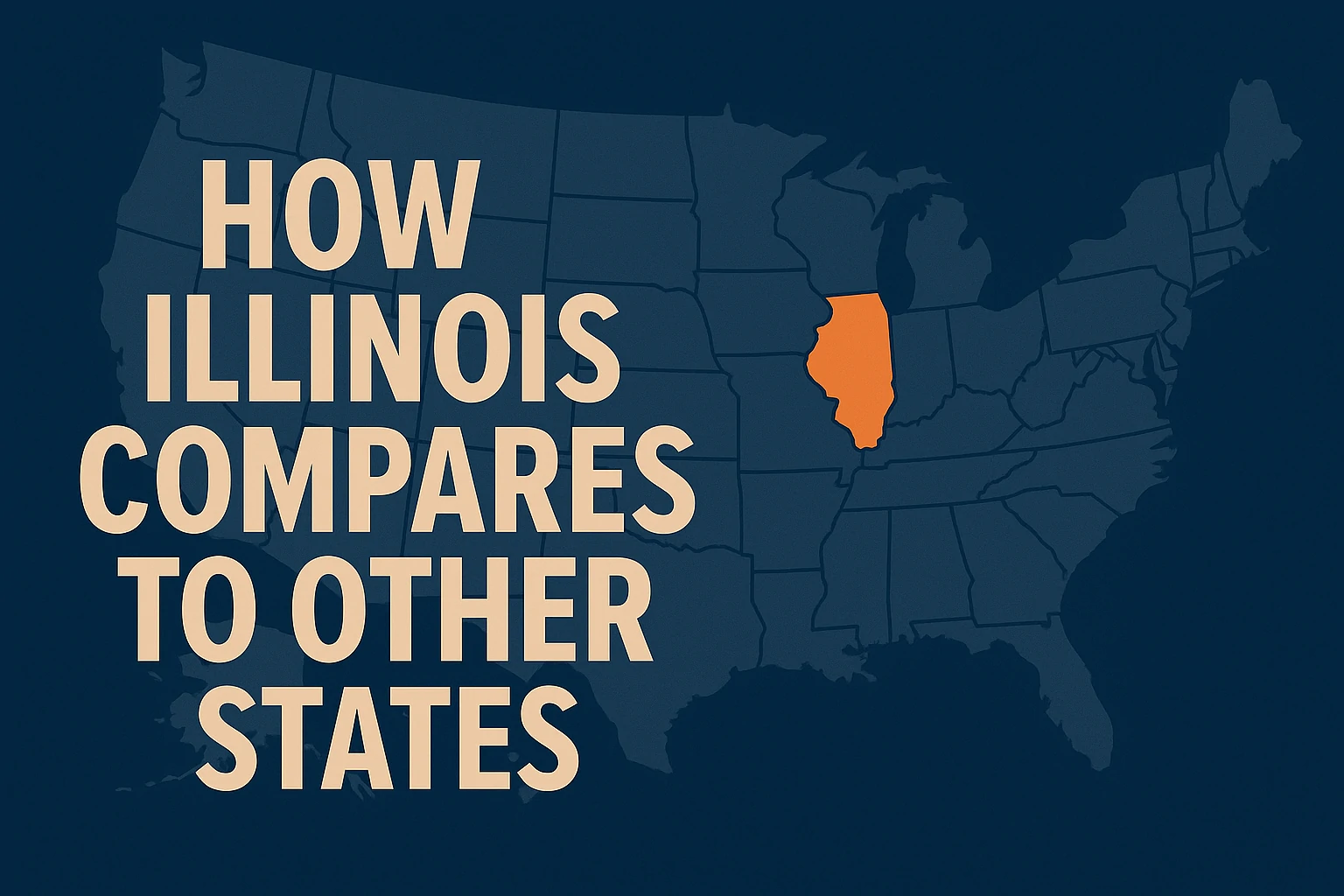
Each state has its own rule. In Indiana, the age of consent is 16. That law is different from Illinois and can cause confusion if someone crosses state lines. In Wisconsin, it is 18. Missouri sets it at 17, like Illinois. That means your relationship may be legal in one state and a crime in another.
If you cross a state line, the rule changes. A person may face charges in both states if the act crosses borders. Federal law may also step in if the case involves travel, internet use, or minors from different areas.
Always check the law where you are. Do not trust what you heard in another state. Illinois law applies within Illinois borders. The court expects you to follow it, no matter where you came from.
Protecting Yourself and Others
The best way to stay safe is to follow the law. Do not guess. Do not take chances. Know the rules, ask the right questions, and walk away if things feel wrong.
If you are unsure about someone’s age, do not move forward. If you feel pressure, stop. If someone seems too young or too eager, say no. One smart choice today can save your whole future. To learn more about relationship laws and legal harm, see the article on alienation of affection here.
Parents should talk to their teens. Schools should teach these rules. Friends should look out for each other. When people speak up, fewer mistakes happen. When people stay quiet, more lives get hurt.
If You Face a Consent Case
If someone accuses you of breaking the consent law, get legal help. Do not talk to police alone. Do not try to fix the story. Do not reach out to the other person. That may make the case worse.
A lawyer can guide your next steps. They can tell you your rights. They can protect you from saying the wrong thing. They may also help prove your case or reduce your charges.
Every minute counts. The faster you get help, the more options you have. Courts take consent cases seriously. You must take them seriously too.
Conclusion
Illinois sets the age of consent at 17. This law protects minors and adults. It creates a clear rule. If you cross that rule, you risk jail, shame, and loss. But if you follow the law, you stay safe and protect others too.
This guide shows the full picture. It clears up the confusion. It gives the truth in simple words. Now it is your job to use that truth in real life. Make smart choices. Know the rules. Share the facts. The law is not there to stop love. It is there to protect people from harm.
Let knowledge lead your steps. Let respect guide your actions. When you know the law, you know your limits. And when you know your limits, you live with peace.
Frequently Asked Questions
What is the legal age of consent in Illinois?
The legal age of consent in Illinois is 17. This means anyone under 17 cannot legally agree to sexual activity. The law treats any sexual contact with a person below this age as a crime, even if the minor says “yes.”
Can a 16-year-old legally date a 19-year-old in Illinois?
Dating without sexual activity is not illegal. But if the relationship becomes sexual, the 19-year-old may face criminal charges. The law does not allow sexual acts with anyone under 17, even if the couple agrees and the age gap seems small.
Is it still a crime if the minor lied about their age?
Illinois law does not excuse the act if the minor gave false information. A lie about age does not protect the older person from charges. The court expects adults to take full responsibility before moving forward in any sexual relationship.
Can someone under 18 be on the sex offender list in Illinois?
Juveniles can be placed on the sex offender registry in some cases. The court looks at age, intent, and the facts of the case. If the crime involves force, younger victims, or serious harm, the teen may end up on the list.
Bonus Tip: Use Verified Sources
The internet spreads false facts fast. When it comes to law, one bad source can cause real damage. Always check the law from trusted places. Do not rely on random blogs, comments, or social posts.
Use official sources that follow the law. These include government websites, licensed lawyers, and legal aid groups. They give clear, updated facts.
Here’s a simple table to guide you:
| Source Type | Trusted or Not? | Why It Matters |
|---|---|---|
| Illinois.gov | ✅ Trusted | Direct source for state laws and updates |
| Illinois General Assembly | ✅ Trusted | Shows current statutes and legal text |
| Legal Aid Clinics | ✅ Trusted | Offers real legal help at low or no cost |
| Law Firms | ✅ Trusted | Gives advice from licensed attorneys |
| Reddit or Social Media | ❌ Not Trusted | May share myths or outdated claims |
| Teen forums or blogs | ❌ Not Trusted | Often lack legal knowledge or accuracy |
Trust facts, not guesses. Use the table above to check your source before you act. A strong legal choice begins with strong information.
Disclaimer
This article is for informational use only. It does not give legal advice. Always speak to a licensed attorney in Illinois if you face a legal issue or need guidance on age of consent laws. Laws may change, and each case is unique.

